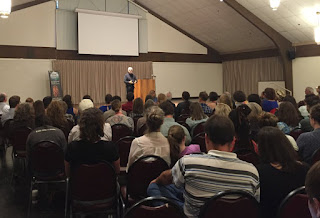 |
| Department of Environmental Quality Secretary van der Vaart presenting Meghan Baker with her Environmental Educator Certificate at The North Carolina Arboretum |
N.C. Department of Environmental Quality Secretary Donald van
der Vaart made a special visit to the North Carolina Arboretum on Thursday to
award Meghan Baker with a certificate for completing her North Carolina Environmental
Education Certification.
Baker is an Extension Agent with Buncombe County Cooperative
Extension Service and provides educational outreach to small farmers, youth,
and community members in Buncombe County through field-based workshops during
the growing season and trainings in the winter.
She is among several certified environmental educators who
chose to partner with The North Carolina Arboretum to create ecoEXPLORE
Hotspots at public libraries in Buncombe County. The development of the
hotspots served as the required community partnership project for the program.
The North Carolina Arboretum developed the ecoEXPLORE (Experiences
Promoting Learning Outdoors for Research and Education) program that includes
many county and state partners. EcoEXPLORE is an incentive-driven science
enrichment program that engages third through eighth-grade students in both guided
and self-directed citizen science activities. The arboretum partnered with the
Buncombe County Public Library System to install an ecoExplore “Citizen Science
HotSpot” at each of the 12 public libraries in the county. Baker served as the
lead coordinator for the ecoExplore Hotspot at the West Asheville Library.
As part of her hotspot, Baker created a pollinator garden
and developed educational materials to encourage library patrons, particularly
youth, to observe and record the diversity of living organisms right outside
the library doors. “This project not only connected me to my local library
branch, but also connected me to the larger community through interactions with
people as I was tending the garden - it's amazing how interested people can be
if you allow them the opportunity to ask questions!”
The project also helps the arboretum expand its mission to
cultivate connections between people and plants. Baker’s educational display at
the library and plant list were tailored for library patrons who are interested
in creating similar “hotspots” in their yards. She also worked with library
staff to lead a summer youth program that directly educated participants about
the topic of biodiversity. “The West
Asheville community is a very urban environment that is highly walkable and
includes a mixed population of young families, millennials, and retirees. The
library is located on a main road through the heart of West Asheville, and as
such, is extremely visible. Due to the site’s walkability and visibility and
the larger community interest in environmental awareness, it would be expected
that this site should attract a good deal of interest in the ecoEXPLORE
Hotspot,” said Baker.
When asked about her experience in the certification
program, Baker said she enjoyed networking with environmental educators across
the state. “We have so many talented and humble naturalists involved in this
program and it’s a great way to widen the community of passionate educators.
The exposure to resources, particularly curriculum guides, has helped me many
times as I’ve created programming for varied audiences.”
Baker said that the program taught her many different
methods for developing effective, hands-on and interactive lessons. “The
program helped expand my creativity, exposing me to lesson plans, games, and
artistic ways to convey environmental awareness and observations.”
Jonathan Marchal, youth education manager with the arboretum
said, “Meghan is an example of the type of outstanding educator and community
leader that we are fortunate to have found through our partnership with the DEQ
Office of Environmental Education and Public Affairs.”
Baker enjoys experiencing the ecology of agricultural
systems, and is continually working to maximize the potential of balancing
production demands with conserving biodiversity. She is particularly interested
in pollinators and the conservation of farm and wild lands.
Baker says the certification program has changed the way she
looks at environmental issues. “I would say that this certification program
helped me to present a more balanced view of environmental issues, providing me
with tools that broadened my environmental ethic beyond a personal experience
to a more holistic and approachable way of connecting to others.”




